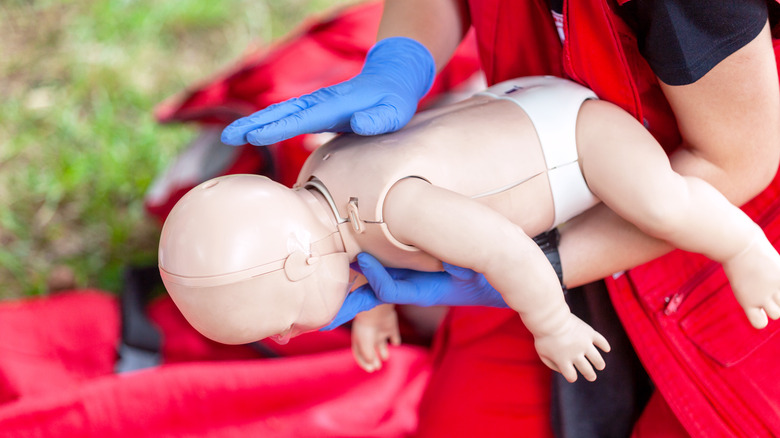When You Choke To Death, This Is What Happens To Your Body
Healthline reports that choking is frequently caused by eating too quickly, failing to chew enough times, by other sudden bodily functions of the throat while eating or drinking, or simply when inquisitive children decide that a certain object just has to go in their mouths at that very moment.
The Heimlich maneuver can be administered to remove the offending blockage. Health Research Funding says that 100,000 lives have been saved by this technique since its invention in 1974. Sadly, though, choking to death is the fourth-most-common accidental injury death (per the National Safety Council), and it's a very traumatic way to go. Here's what happens to the body as it dies by choking.
Heimlich Heroes states that choking occurs when the epiglottis fails in its usual job of preventing food from entering the trachea. On entering the windpipe, a morsel can cut off the supply of air to the lungs. If a simple eruption of coughing doesn't free said blockage, the body begins a series of awful and involuntary processes in an attempt to save itself.
The brain is utterly dependent on a constant oxygen supply, and E Medicine Health reports that the organ starts to die around five minutes after losing this supply. It can take less than ten minutes for the brain to completely die, beyond which there is no hope of recovery.
The oxygen-starved body fails very quickly
With a severe blockage, the person choking may barely be able to breathe or cough at all, leaving them in an awful panicked state of trying to communicate their predicament to those in the vicinity. Somebody choking will often grip their own throat, though the body does exhibit more subtle signs of choking to death. One of these, per E Medicine Health, is cyanosis, or the skin gradually turning slightly blue. This tends to first appear in the lips and face, reflective of the restricted air supply.
According to The Spectator (via Ranker), the body will reflexively shut the trachea down tight, to prevent further unwelcome blockages. Sadly, this will generally only make the thing somebody is choking on harder to dislodge.
From loss of consciousness to tremendous pain (should the blockage damage the delicate throat during frantic struggles), choking to death is horribly traumatic. Even in those who survive, the long-lasting effects of choking can cause awful damage to the brain. Of the most common victims, children, Dr. Gail Herman of The Children's Trust reported (via The Daily Mail): "If you are five, you've got a lot of learning already embedded. But if you are one or two, then your prognosis is likely to be worse."

